|
De Nederlandse schrijver en dichter J. Bernlef werd geboren op 14 januari 1937 in Sint Pancras. Zie ook mijn blog van 14 januari 2007 en ook mijn blog van 14 januari 2008 en ook mijn blog van 14 januari 2009 en ook mijn blog van 14 januari 2010.
Blinddruk
Stemmen die wilden klinken
maar in stilte steken bleven
Dooierloos ei
onverpopte vlinder
De gedroomde aanzet tot het begin
van een eerste aarzelende zin
Maar de lippen alweer gesloten
dooft het denken
Onbegonnen werk licht op.
Conservatorium
De ramen van het conservatorium staan wijdopen
daarbinnen vergrijpt iemand zich aan eeuwenoude gevoelens
de vleugel jammert en klaagt
In het park scheren zwaluwen het gras
oogsten lucht en insecten
Hoe te leven? Voor wat?
Grote vragen waarop kleine antwoorden passen
Zo precies als deze zwaluwen die geven
vliegensvlug
Iemand daarbinnen houdt plotseling op met spelen
vloekt en slaat zijn vleugel dicht.
Geluk
In takken groeperen zich groene zinnen
popelend om alle kanten uit te lopen
Op stoeptegels een kindertekening
door regenschrift al half gewist
Achter een dakkapel begint een merel te zingen
houdt dan midden in zijn herinnering op
In mijn hoofd vertwijgt zich zijn lied - niemand
ziet iets aankomen, dat is ons geluk.
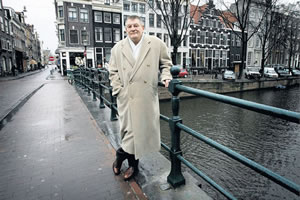
J. Bernlef (Sint Pancras, 14 januari 1937)
De Britse schrijver en journalist Edward St Aubyn werd geboren op 14 januari 1960 in Cornwall. Zie ook mijn blog van 14 januari 2009 en ook mijn blog van 14 januari 2010.
Uit: Nette Aussichten (Some Hope, vertaald door Dirk van Gunsteren)
Patrick erwachte und wusste, dass er geträumt hatte, konnte sich aber an den Inhalt des Traums nicht erinnern. Ihn quälte der vertraute Wunsch, etwas zu fassen zu bekommen, das soeben aus dem Bewusstsein entschwunden war, auf dessen Existenz jedoch gerade durch sein Fehlen geschlossen werden konnte - wie man aus herumwirbelnden Papierfetzen schließen kann, dass ein schneller Wagen vorbeigefahren ist.
Die verschwommenen Fragmente seines Traums, in dem er anscheinend an einem Seeufer gewesen war, vermischten sich mit der Aufführung von Maß für Maß, die er am Abend zuvor zusammen mit Johnny Hall gesehen hatte. Obwohl der Regisseur als Bühnenbild einen Busbahnhof gewählt hatte, konnte nichts den Schock mildern, das Wort "Gnade" derart oft an einem einzigen Abend zu hören.
Vielleicht entstanden all seine Probleme daraus, dass er das falsche Vokabular verwendete, dachte er mit einer kurzen Aufwallung von Erregung, die es ihm gestattete, die Bettdecke zurückzuschlagen und zu erwägen aufzustehen. Er bewegte sich in einer Welt, in der das Wort "Wohltätigkeit", gleich einer schönen, von ihrem eifersüchtigen Ehemann unablässig bewachten Frau, ausschließlich in Begleitung der Wörter "Essen", "Komitee" oder "Ball" auftrat. Für "Mitgefühl" hatte niemand Verwendung, wogegen "Milde" häufig vorkam, und zwar in Form von Klagen über die Kürze von Gefängnisstrafen. Dennoch wusste er, dass seine Schwierigkeiten grundsätzlicherer Natur waren.
Er war erschöpft von seinem lebenslangen Bedürfnis, Widerstreitendes miteinander zu vereinbaren: Er wollte in seinem Körper und außerhalb seines Körpers sein, im Bett und auf der Vorhangstange, in der Vene und in der Spritze, ein Auge hinter einer Augenklappe verbergen und mit dem anderen die Augenklappe mustern; er mühte sich, dem ständigen Beobachten ein Ende zu setzen, indem er sich in die Bewusstlosigkeit trieb, und fühlte sich dann gezwungen, die Ränder der Bewusstlosigkeit zu beobachten und die Finsternis sichtbar zu machen; er entzog sich jeder Anstrengung, verdarb das Nichtstun jedoch durch Rastlosigkeit, er fand Wortspiele verlockend, hatte aber einen Widerwillen gegen das Virus der Zweideutigkeit; er neigte dazu, Sätze in der Mitte mit dem Scharnier eines einschränkenden "aber" zu versehen, sehnte sich jedoch danach, seine Zunge wie eine Eidechse entrollen und eine vorbeisausende Fliege mit unfehlbarer Präzision fangen zu können; er versuchte verzweifelt, der selbstzerrüttenden Ironie zu entkommen und zu sagen, was er wirklich meinte, doch das, was er wirklich meinte, vermochte nur Ironie auszudrücken.
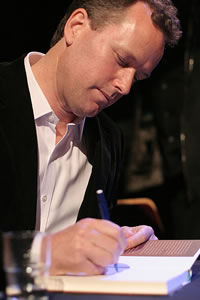
Edward St Aubyn (Cornwall, 14 januari 1960)
De Japanse schrijver Yukio Mishima werd geboren op 14 januari 1925 in Tokyo. Zie ook mijn blog van 14 januari 2007 en ook mijn blog van 14 januari 2008 en ook mijn blog van 14 januari 2009 en ook mijn blog van 14 januari 2010.
Uit: The Sound of Waves (Vertaald door Meredith Weatherby)
UTA-JIMASong Islandhas only about fourteen hundred inhabitants and a coastline of something under three miles.
The island has two spots with surpassingly beautiful views. One is Yashiro Shrine, which faces northwest and stands near the crest of the island. The shrine commands an uninterrupted view of the wide expanse of the Gulf of Ise, and the island lies directly in the straits connecting the gulf with the Pacific Ocean. The Chita Peninsula approaches from the north, and the Atsumi Peninsula stretches away to the northeast. To the west you can catch glimpses of the coastline between the ports of Uji-Yamada and Yokkaichi in Tsu.
By climbing the two hundred stone steps that lead up to the shrine and looking back from the spot where there is a torii guarded by a pair of stone temple-dogs, you can see how these distant shores cradle within their arms the storied Gulf of Ise, unchanged through the centuries. Once there were two "torii"; pines growing here, their branches twisted and trained into the shape of a torii, providing a curious frame for the view, but they died some years ago.
Just now the needles of the surrounding pine trees are still dull-green from winter, but already the spring seaweeds are staining the sea red near the shore. The northwest monsoon blows steadily from the direction of Tsu, making it still too cold to enjoy the view.
Yashiro Shrine is dedicated to Watatsumi-no-Mikoto, god of the sea. This is an island of fishermen and it is natural that the inhabitants should be devout worshippers of this god. They are forever praying for calm seas, and the very first thing they do upon being rescued from some peril of the sea is to make a votive offering at the sea-god's shrine.
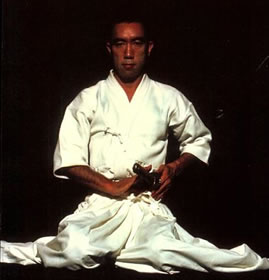
Yukio Mishima (14 januari 1925 - 25 november 1970)
De Chinese schrijfster Anchee Min werd geboren in Shanghai op 14 januari 1957. Zie ook mijn blog van 14 januari 2009 en ook mijn blog van 14 januari 2010.
Uit: The Last Empress
In 1852, a beautiful seventeen-year-old girl from an important but impoverished family of the Yehonala clan arrived in Peking as a minor concubine to the young Emperor, Hsien Feng. Tzu Hsi, known as Orchid as a girl, was one among hundreds of concubines whose sole purpose was to bear the Emperor a son.
It was not a good time to enter the Forbidden City, a vast complex of palaces and gardens run by thousands of eunuchs and encircled by a wall in the center of Peking. The Ching Dynasty was losing its vitality and the court had become an insular, xenophobic place. A few decades earlier, China had lost the first Opium War, and it had done little since to strengthen its defenses or improve its diplomatic ties to other nations.
Within the walls of the Forbidden City the consequences of a misstep were often deadly. As one of hundreds of women vying for the attention of the Emperor, Orchid discovered that she must take matters into her own hands. After training herself in the art of pleasing a man, she risked everything by bribing her way into the royal bedchamber and seducing the monarch. Hsien Feng was a troubled man, but for a time their love was passionate and genuine, and soon she had the great fortune to bear him his only son and heir. Elevated to the rank of Empress, Orchid still had to struggle to maintain her position as the Emperor took new lovers. The right to raise her own child, who was under the control of Empress Nuharoo, the Emperors senior wife, was constantly at issue.
The invasion by Britain, France, and Russia in 1860, and the subsequent occupation of Peking, forced the Chinese court into exile in the distant hunting reserve of Jehol, beyond the Great Wall. There the humiliating news of the harsh terms for peace contributed to the decline of the Emperors health. With the death of Hsien Feng came a palace coup, which Orchid helped to foil with the help of her brother-in-law Prince Kung and General Yung Lu. The handsome Yung Lu reignited romantic feelings in the still young Orchid, but in her new position of power there was little opportunity for a personal life. As coregent with Empress Nuharoo until her sons maturity, Empress Orchid was at the beginning of a long and tumultuous reign that would last into the next century.
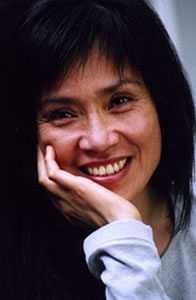
Anchee Min (Shanghai, 14 januari 1957)
De Amerikaanse schrijfster Mary Robison werd geboren op 14 januari 1949 in Washington D.C. Zie ook mijn blog van 14 januari 2009 en ook mijn blog van 14 januari 2010.
Uit: Why Did I Ever?
17
Nine West, I've never really had great luck with their shoes. They can look terrific but they have sharp arches and hard fucking soles.
Once in New York on my way to Penn Station I had to stop and remove the Nine West shoes I was wearing. I had to walk on in my stocking feet. Barrabus, I think he was called, was with me. My husband then but he wouldn't wait up, wouldn't take an extra minute out, oh no.
"Just keep going!" I called to him. "However eventually, I will meet you there."
That ex I heard was arrested for stealing food. Maybe I only dreamed it. It's what I tell people, anyway.
18
I call my doctor's office to ask for some Ritalin. His nurse answers and says, "This is Annabelle. According to our records, you're not due for a prescription at this time."
I say, "Annabelle, this is not what it appears."
"Oh?" she says and waits because she was trained to wait and force me to do the synopsizing.
I will take that challenge. "There was a series of mishaps," I tell her. "Some were spilled at the sink or ruined by moisture. Then a vial I use for travel got mislaid and they're gone. I'm out," I say. "Who can explain it?"
But I'm a stupid woman for asking that question. Nurse Annabelle can explain what happened to my drugs.
Without Ritalin I can sustain an evil thought or two, such as: "That there feels like cancer of the esophagus." However, I'm liable to skip over more routine kinds of thinking, such as, "Move up in line here," or "Steer."
So I'm in bed. I'm in bed unless Dr. Rex himself calls to inform me he's written new prescriptions.
More emphatically, I am in bed until.
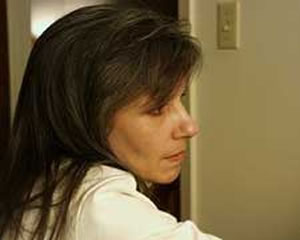
Mary Robison (Washington, 14 januari 1949)
Zie voor nog meer schrijvers van de 14e januari ook mijn vorige blog van vandaag en eveneens mijn eerste blog van vandaag.
14-01-2011 om 19:37
geschreven door Romenu 
Tags:J. Bernlef, Edward St Aubyn, Yukio Mishima, Anchee Min, Mary Robison, Romenu
|

